Thanks to sashiko's ongoing trend, many smaller brands that produce sashiko material, needles, fabric, and thread have popped up over the last years. | The main players in 2024
Even fifteen years ago, when I started doing sashiko, there were only a handful of makers and their products were hard to find. Now there are plenty of choices out there.
These companies are the ones that are on Japanese store shelves everywhere:
Yokota Co., Ltd., the brand with the Daruma
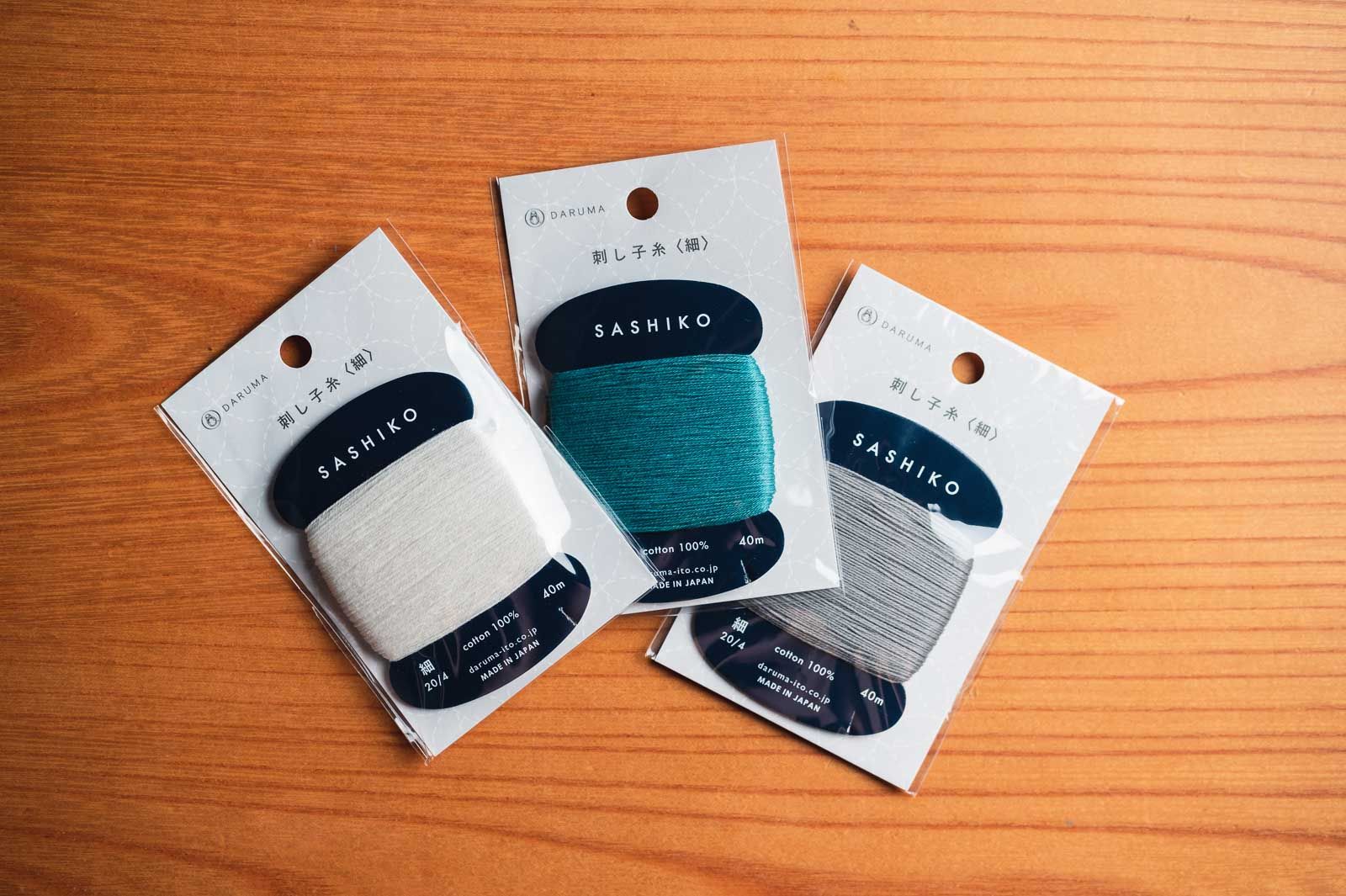
Daruma thread is well known amongst sashiko fans, but the company's name is actually not "Daruma" but 横田株式会社 yokota kabushikigaisha, which translates to "YOKOTA CO., LTD".
Of all the companies producing sashiko material, Yokota has the longest history. With only about 80 employees, Yokota is a small business that puts quality first. Their slogan: "Prices change. Quality endures." – is obvious in their products' quality.
All products that are produced in Japan feature the daruma somewhere on the packaging. Originally, the daruma was attested to their superior quality product line.
Stitches on the Run is reader-supported. When you buy through links on my site, I may earn an affiliate commission. It doesn't cost you anything extra but it helps keep my blog and my stitches running. Love ya!
Yokota's History
Yokota Co,. Ltd. was founded in 1901 by Yokota Chōzaemon, who aimed to "produce the world's best thread". So much for dreaming small. The first product was "silk cotton thread", which was made of cotton with a smoothness similar to silk.
Yokota always went with the times. When women were relieved from daily chores thanks to electrical appliances, they would hold lace classes to promote their thread.
These days, they regularly publish pattern books, and hold workshops at their store in Tokyo.
Their product range is not as wide as that of the other companies listed here, but their products are carefully selected according to new trends and their design is minimal and beautiful.
Instead of aiming at growth, Yokota seems to be more interested in sustainability.
Quality of Yokota's products
My recommendations are probably biased by the extremely beautiful design of Yokota's packaging. That being said, I have never had any trouble with any of my purchases. The thread isn't only of the best quality, the colors are wonderful and it feels as if somebody poured their heart into making it perfect.
Recommended products from Yokota
Honestly, I just about recommend everything from them.
One of my favorites is their "Sashiko Box Selection", which consists of 15 different thin sashiko thread cards, 4 needles of different sizes, a needle threader, and a pincushion in a beautiful minimal box.
I haven't found the set for purchase outside of Japan, but if you are looking for something similar, this starter set provides everything you need for your first steps in sashiko.
If you deserve something nice, you should order their sashiko thread assortment with 37 different colors. They come in a beautiful box.
Their sashiko samplers are great for lazy people or people just starting sashiko. The line-up in Japan is getting bigger each year, but you can even find a nice selection on Amazon these days.
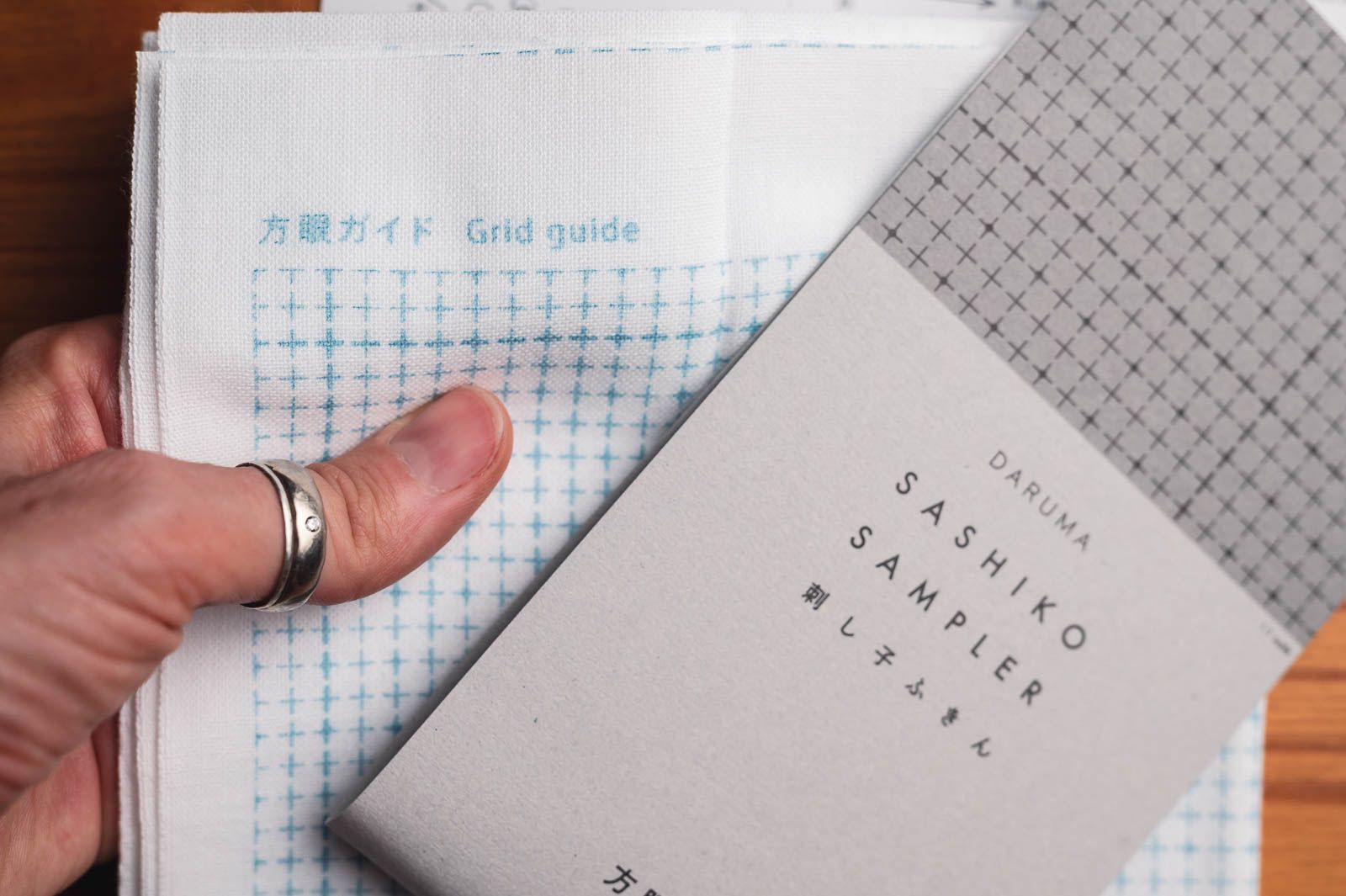
If the product doesn't have to be related to sashiko, my favorite product is their "Home Thread Ball #30", as the color combination is incredible! Sadly, I haven't found these for sale outside of Japan.
Olympus, reliable quality at a good price
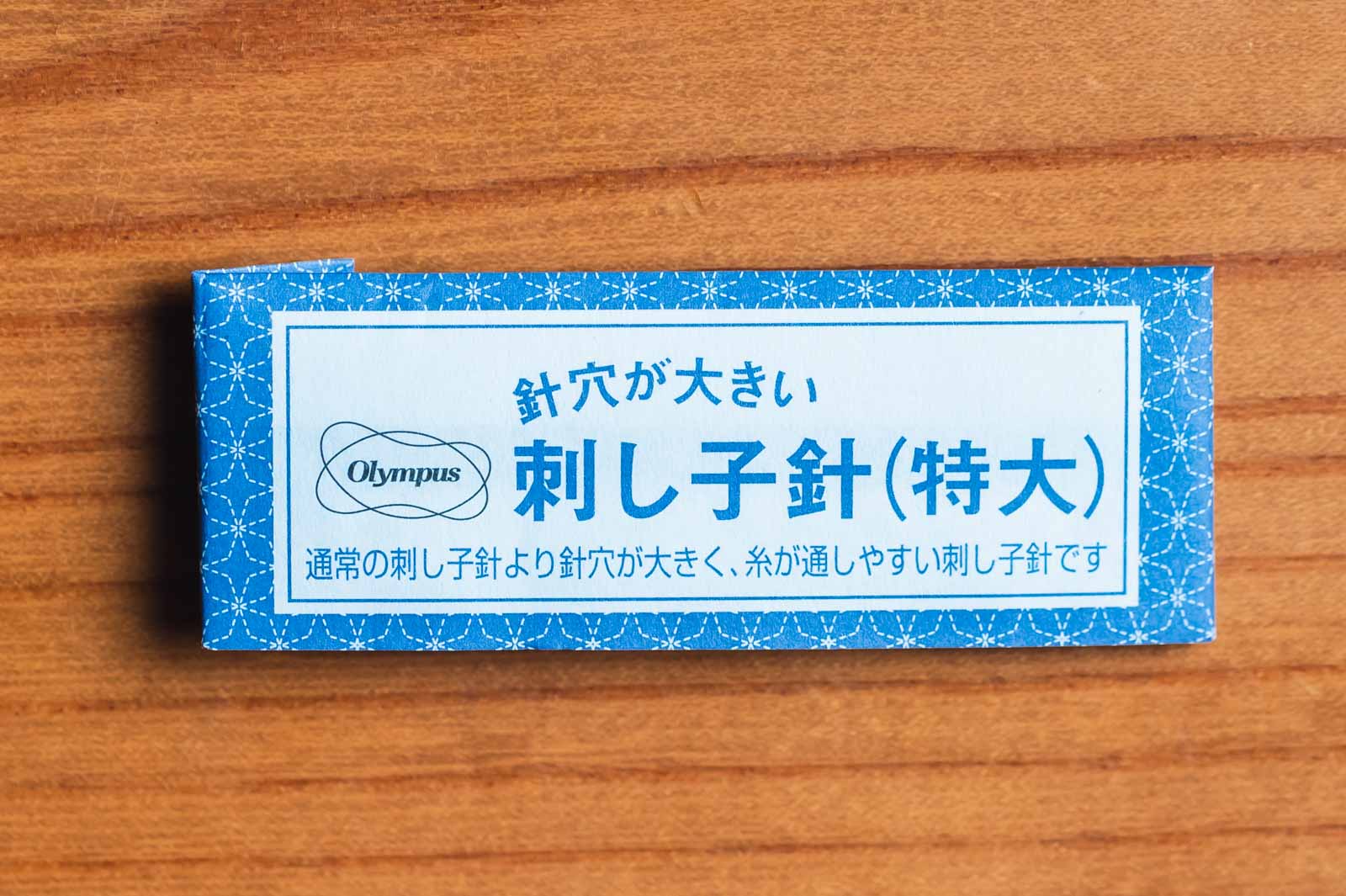
Olympus's full name in Japanese is オリムパス製絲株式会社 orimpasu seishi kabushikigaisha, in English "Olympus Thread Mfg. Co., LTD."
Although I couldn't find any precise numbers, it is estimated that Olympus has between 30-100 employees.
The company has an English homepage and although you can't purchase directly from them, it's nice that you can see their current lineup. The English seems to be machine-translated, but it still provides some information to non-Japanese speakers.
Olympus' History
The company was founded in 1908 in Nagoya and has been specializing in stitching material ever since, thread in especial.
Olympus' opening products were cotton threads for hand sewing and machine sewing.
But they also produce needles, fabric, and other tools for various crafts. You can take a look at their current lineup in the 2024 catalog.
The first products related to sashiko were kogin thread and kogin embroidery kits were released in 1955.
But it wasn't until 1979 before Olympus first produced sashiko thread and kits. A year later, the company added hanafukin, cute dishcloths, to its production line.
In 2020 thin sashiko thread was added to its collection of threads and a new range of colors was added two years later.
Apart from its five locations in Japan, Olympus has also an office in China.
Quality of Olympus products
Olympus makes great quality crafting supplies across the board. Their quality is reliable and you can't really go wrong with any of their products.
Their design was not very modern until they finally updated it in 2023. I'm super happy with the rebranding! I guess after Daruma dished up their lovely new design Olympus had to update theirs, too.
Recommended products from Olympus
Olympus' starter kits are extremely handy for beginners. The kits come with instructions that are easy to understand and include everything to start: fabric with a pre-printed pattern, the right amount of thread, and a good-quality needle.
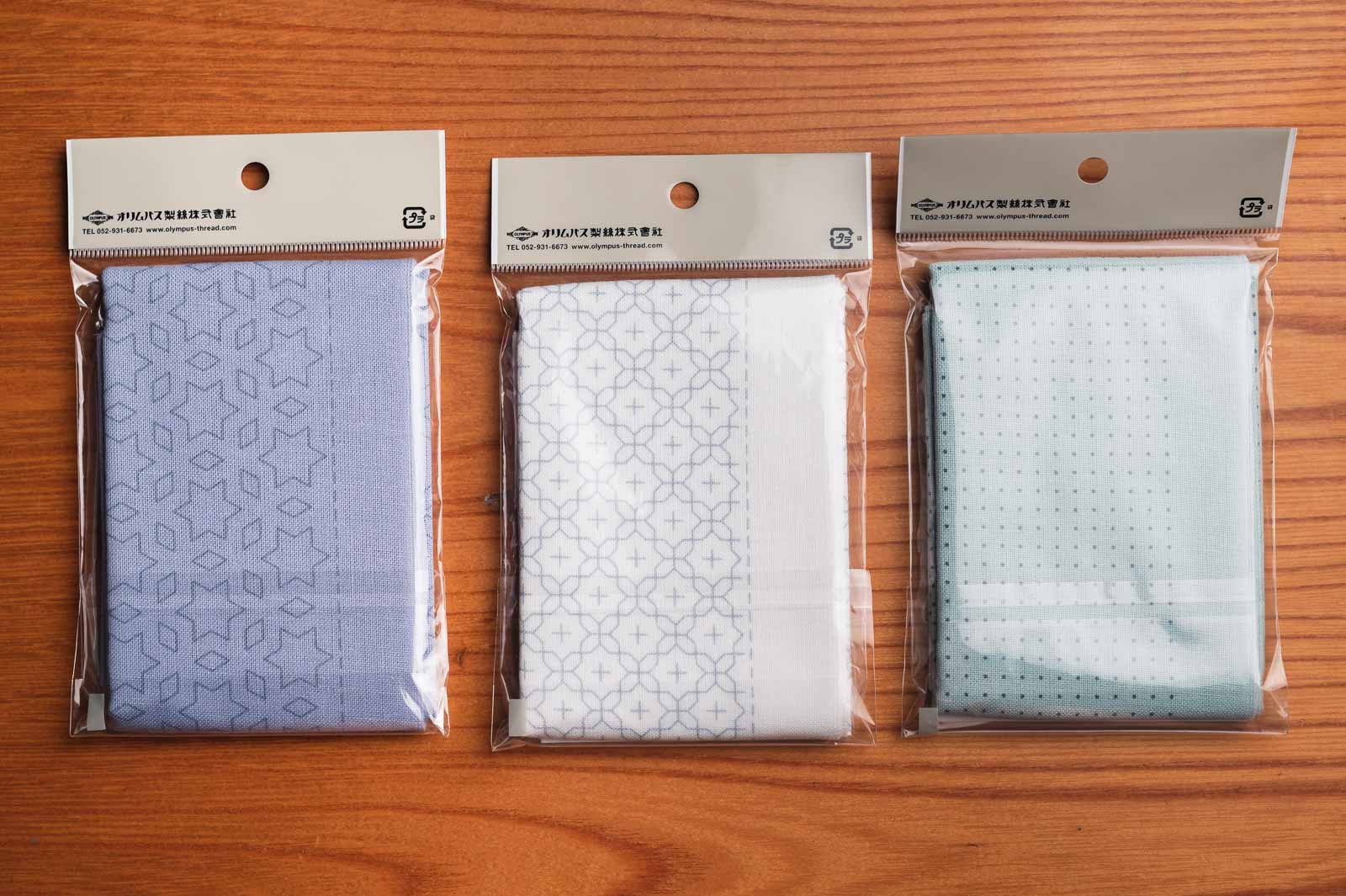
An Olympus starter kit was how I started sashiko. Thanks to the kit, my first sashiko project resulted in a beautiful hanafukin. If you are interested, this one is great for beginners, but you'll have to add a pre-printed pattern as it's not included in this set.
Olympus thread is sold in pretty much any handicraft store, and is also readily available on Amazon.
Before I made my own sashiko thimble, I used this palm thimble and was very happy with it. I highly recommend it. I actually still use mine even after around 15 years.
Fujikyu Corporation, the brand for everyone
Under the umbrella of Fujikyu Holdings, Fujikyu Corporation runs various online shops and offers not only craft supplies but also workshops, there are regular publications for various crafts, learning programs, and more than 400 physical stores all across Japan.
Craft Heart Tokai, their biggest chain store, offers a wide selection of in-house craft supplies and other companies' products at their stores.
Even though I prefer smaller businesses to big conglomerate giants, I must admit that Craft Heart Tokai's staff are always very helpful and have never left any of my questions unanswered.
Fujikyu's History
Fujikyu Corporation was founded in 1961. At the time it specialized in the making and selling of silk thread.
Seven years later it opened the first outlet of its chain store 手芸のすずらん shugei no suzuran, literally "Lily of the Valley of Handicraft."
In 1980 Fujikyu Corporation added a mail-order service for craft material, which was so successful that they added additional mail order services for knitting, clothing, and sundry goods over the course of fifteen years.
In 1983 a 手芸センタートーカイ shugei senta- to-kai store was opened, which was remodeled into the first Craft Heart Tokai in 2002.
Only a year later, Fujikyu Corporation joined the Tokyo stock exchange market aiming at even faster growth. By June 2020 the corporation had 419 physical stores.
Recently, 藤久株式会社 fujikyū kabushikigaisha, which translates to Fujikyu Corporation has been put under the umbrella of 藤久ホールディングス株式会社 fujikyū hōrudingusu kabushikigaisha, in English simply Fujikyu Holdings.
The merger happened in January 2022, making it one of the biggest companies invested in sashiko. In July of the same year, Fujikyu Holdings acquired 日本ヴォーグ社 nihon vo-gu sha, Japan Vogue Publication as a subsidiary.
The Japan Vogue Publication brings out sashiko books regularly. While their products don't get a lot of love from designers, their books do.
My favorite sashiko book was published by Japan Vogue Publication. The English version, which sadly doesn't look quite as nice, has been published by Tuttle:
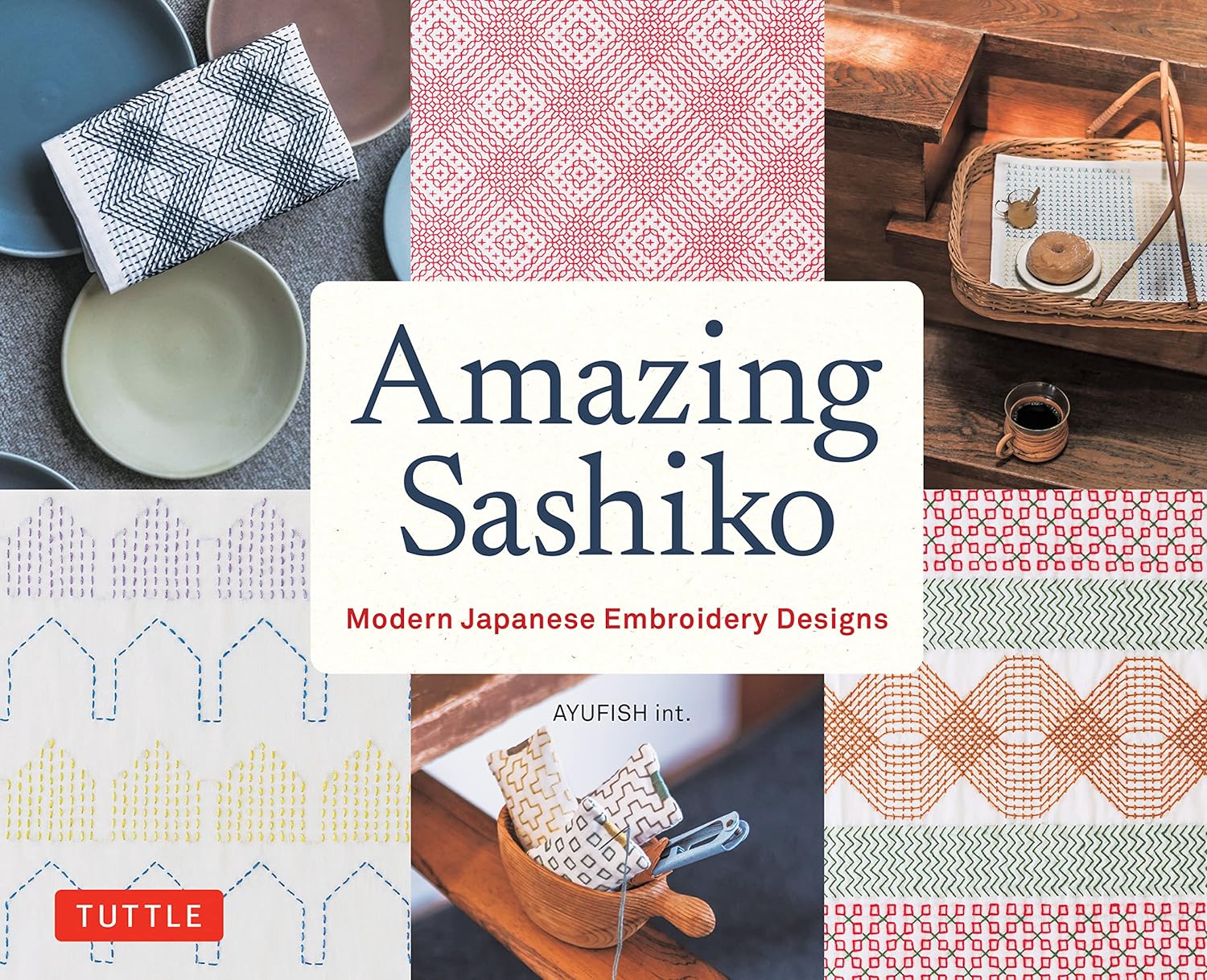
Amazing Sashiko
As the title promises this book has a modern take on a traditional handcraft. At the time of this writing, it has only 5-star reviews. And very deservedly so!
The writer used to work in space engineering, maybe that's where she got her inspiration for the book? Highly recommend!
Quality of Fujikyu's products
Fujikyu Holdings meets the quality expectations toward Japanese companies. I have never purchased a product that I was not fully satisfied with from them.
But trying to satisfy everyone's needs, I feel like the company doesn't really speak to anyone in particular. At least not me.
Fujikyu once had a pretty impressive online store, but it shut down in October 2023. They still sell products via Amazon and Rakuten, but apart from thread, they now mainly sell products by other makers.
Maybe their sashiko department didn't make enough profit?
Recommended products from Fujikyu
I have purchased craft supplies at Craft Heart Tokai many times, but somehow I always end up buying products from different makers.
They were selling pre-printed fabric with a width of 106cm by the meter for a while. The width for pre-printed cloth is usually the standard width for yukata fabric, so only around 30cm. This new size was great for clothes and other bigger projects. I wish they still had it...
If you get a chance, visiting one of their Craft Tokai stores is a delight if you like sashiko or other handicrafts!
Lecien Corporation, readily available everywhere
Lecien is another big conglomerate, though I am not sure whether it is bigger than Fujikyu. It has branched out into Asia and has been ramping up its sashiko production line quite a bit in recent years.
Lecien's History
Lecien started out in 1933 as Nomura Shoten in Kyoto. It focused on importing textiles and daily goods to sell in Japan. Soon after they added lace to their portfolio and by 1946, Nomura Shoten turned into Nomura Shoten Co., Ltd..
In 1950, they started selling Cosmo embroidery floss and adding several other products, especially in the fashion category, to their line-up.
The company name was changed to 株式会社ルシアン kabushikigaisha rushian "Lecien Corporation" in 1992.
In the following two decades, the company established companies in Vietnam, China, and Cambodia.
In 2009, Lecien Corporation was absorbed by Wacoal Corporation.
Sashiko thread has only been added in recent years under the name Hidamari Sashiko.
Quality of Lecien's products
Lecien offers the same high-quality standard that people have come to love about Japanese products. The sashiko thread they offer is produced in Japan and unlike most other sashiko threads, it is sold on bobbins, which helps keep your thread tangle-free.
Recommended products from Lecien

Lecien's Hidamari sashiko thread no. 105
Soft thread with unique colors. No. 105 is my favorite.
Lecien's variegated threads have a very unique look. I love how soft they are. It makes them easy to work with.
Lecien has also added pre-printed fabric to its line-up. I couldn't find any outside of Japan, but considering that Lecien thread is available abroad, I assume it won't take long before pre-printed fabric will be available, too.
Hobbyra Hobbyre, eccentric grown up
Hobbyra Hobbyre's history
Hobbyra Hobbyre was founded in 1975 as 株式会社ダイヤクラフト kabushikigaisha daiyakurafuto, "Diamond Craft Corporation" a subsidiary of Mitsubishi Pencils.
Within a month of its foundation, the company opened a store in Tokyo's luxury district. It was the first store in Japan that was solely dedicated to hobby and craft.
The store's interior was a vivid red with many carefully selected playthings and craft supplies from all around the world, which gave it the feel of an overturned box of toys.
In the same year, the company released a tabletop weaving machine that became a longtime best-seller.
Until 1985 the company had opened more than 10 stores, started a fabric collection and launched various successful products.
In 1991, the company's name was finally changed to 株式会社ホビーラホビーレ kabushikigaisha hobi-ra hobi-re, "Hobbyra Hobbyre Corporation."
Since 1994, the company regularly does collaborations with other companies, including foreign companies. Something that is quite rare among Japanese craft material companies.
The company has monthly live sessions on its community instagram account.
While Hobbyra Hobbyre Corporation started out as an eccentric, it feels like the company has grown up to produce reliable mainstream supplies. I do wonder what kind of supplies the company would produce if it was still as unconventional as it was in the beginning.
Quality of Hobbyra Hobbyre products
Despite mass production, the quality of Hobbyra Hobbyre's products is great. The products even manage to achieve a soft natural feel. That is not only true for the collaboration products with natural dye artists but for all their threads and fabrics.
Recommended products by Hobbyra Hobbyre
Even though I love traditional sashiko patterns, my favorite product from Hobbyra Hobbyre is the pre-printed cloth with the triangle pattern. I love how both sides of the pattern make triangles: one side bigger, one smaller.
You can take a look at their impressive range of sashiko patterns at the Hobbyra Hobbyre online store. As most Japanese stores, sadly they do not ship overseas.
Their physical stores often show off a vast amount of already stitched patterns, which really helps in choosing. I admit I always end up buying way more than I meant to before entering the store. Brace yourself!

A couple of new producers have appeared in recent years, and there are some smaller brands that produce sashiko-related products. Let me know if that is something that is of interest to you and I'll write a post on the topic.

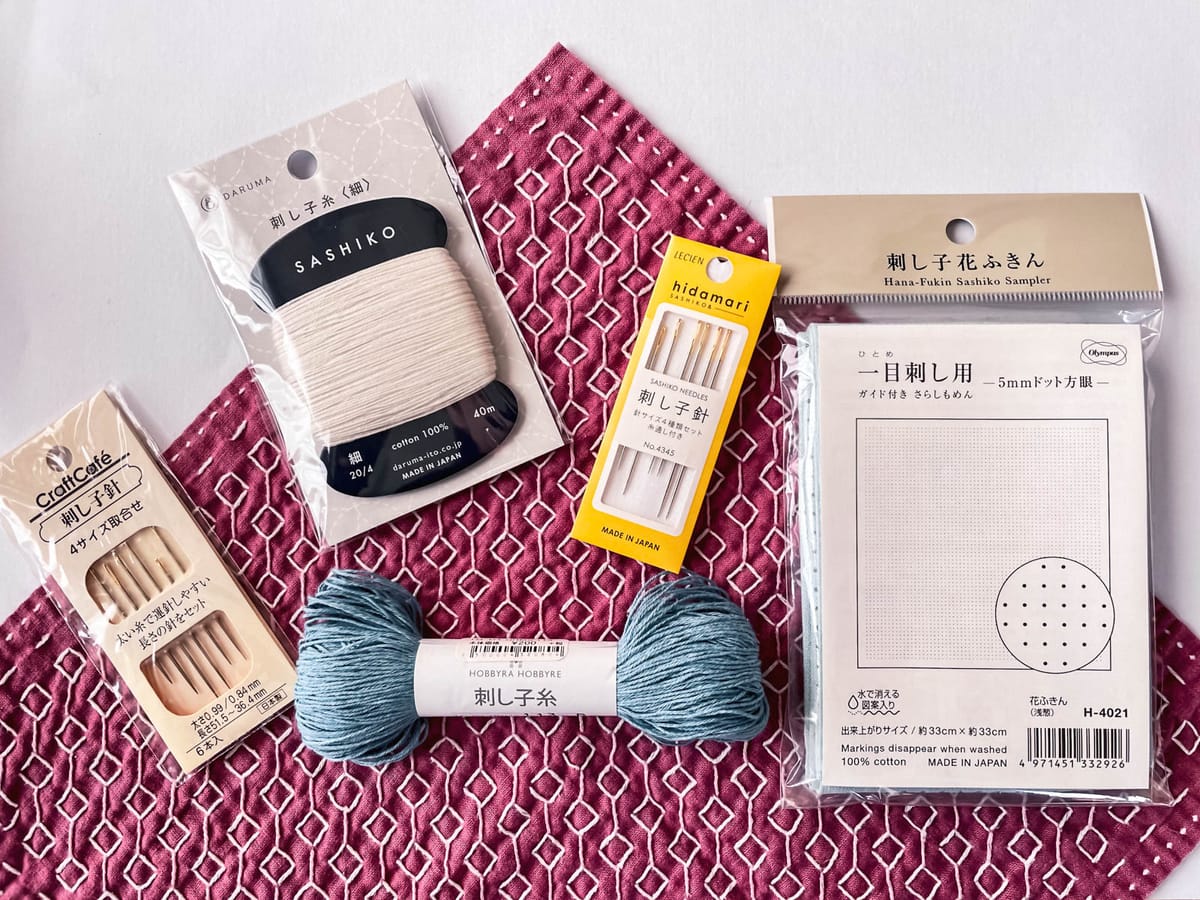
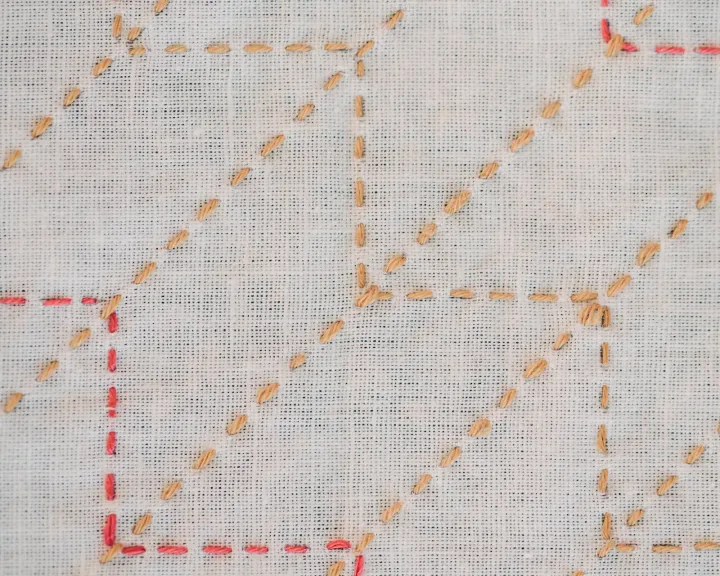
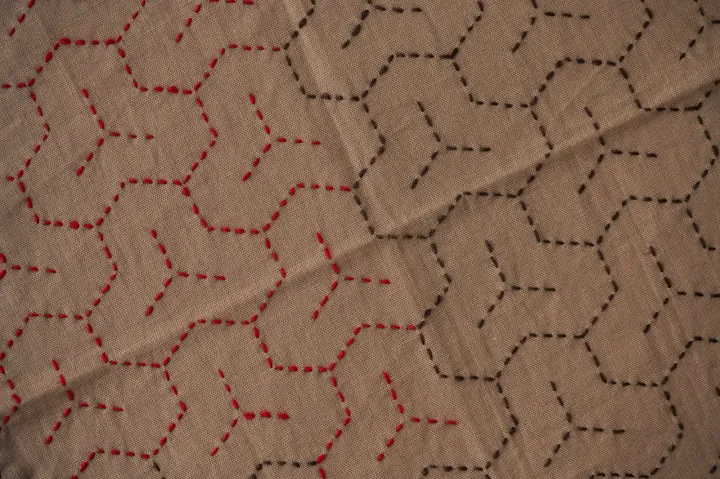
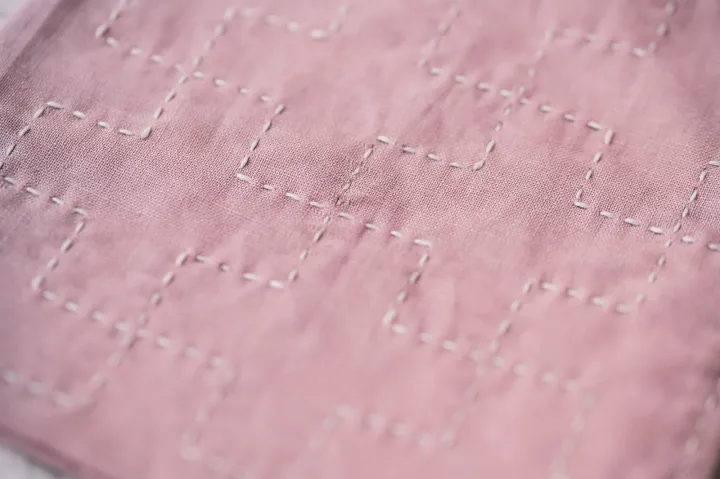
Comments ()